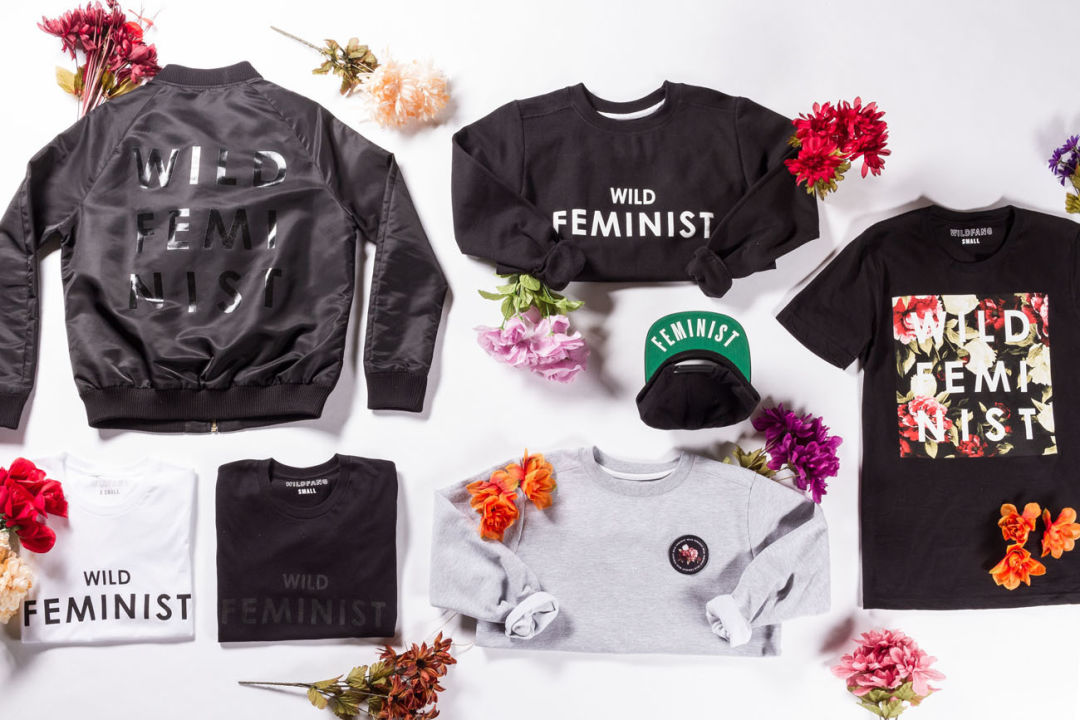Did Forever 21 Knock Off Wildfang's Most Famous Shirt?

Wildfang's collection of signature "Wild Feminist" items
Image: Courtesy Wildfang
A huge fast-fashion chain is accused of knocking off an independent designer, and this time the alleged victim is one of our own. Last week, a customer notified Wildfang owner Emma Mcilroy that a nearly identical copy of her company's “Wild Feminist” shirt was for sale on Forever 21’s website.
A coincidence? Wildfang’s feminist tees are no small thing. An Instagram search turns up miles of photos of Wildfangers proudly boasting the shirt, with many shots tagging the company. The shirt has been a publicity hit and attracted lots of celebrity support. The multi-talented Janelle Monae, now known both for her musical talent and starring roles in Moonlight and Hidden Figures, wore it onstage at Coachella last year. Two Dope Queens host Phoebe Robinson donned one for the Women's March, and then modeled in a Wildfang lookbook this spring. And Broad City’s Ilana Glazer? Well, she prefers the “Wild Feminist” hat, but you get the idea.
In other words, this shirt is not from an unknown baby brand hiding in the deep corners of the Internet. It has a following, not only for its messaging, but also for its charitable contributions. Mcilroy divides a portion of the profits from the tees into donations for Planned Parenthood, the largest single provider of reproductive health services in the country, and to the ACLU, working in overdrive this year.
The small company, with just 24 employees, depends upon the shirt, Mcilroy says. “It is our greatest asset and the thing we are most proud of and spend the most time and energy on,” she says. “When you take that away, you are quite literally taking money out of my employees pockets, because that’s the shirt that pays the bills. Wildfang has given $25,000 to charity in the last 12 months, and in the next 12 we think it could be as much as $150,000.”
This kind of controversy is not new for Forever 21, founded by married duo Do Won Chang and Jin Sook in 1984 as a 900-square-foot apparel store in Los Angeles originally called Fashion 21. According to Forbes, the privately held behemoth had “$4.4 billion in 2015 sales from 790 locations across 48 countries.” And they’ve been accused of knocking off goods a lot—as in, at least 50 times by well-known names such as Diane von Furstenberg, Gwen Stefani, Anna Sui, and Betsey Johnson, just name a few.
Six years ago, Jezebel did a deep dive into the issue with 'How Forever 21 Keeps Getting Away With Designer Knockoffs,' a story that includes side-by-side photos of the above designers' garments with Forever's 21 interpretations next to them.
“Over time I realized that they've been caught so many times, they've been publicly exposed so many times, they've even been sued—although many fewer times, because all they do is settle—and the lightbulb went off: this is just part of their business strategy," Fordham University law professor and fashion legal expert Susan Scafidi told Jezebel. "They go ahead and they take what they want, and when they get caught, they pay up. It's probably cheaper than licensing it in the first place."
Following an online uproar and a story on Refinery 29, Forever 21 quietly took the Wild Feminist shirt down from its web shop. (Forever 21 did not respond to Portland Monthly's request for comment.) For Mcilroy, though, simply removing the product is not enough.
“What I’d love them to do is look back at their sales of that product and match our 10 percent of proceeds going to the ACLU and Planned Parenthood," she says. "That would be cool. And admittedly when you sell a shirt for $10 it would be a lot less than we donate, but they probably sold a lot more. Then we could call it good and everybody could walk away feeling happy about it.”
Mcilroy alleges that dozens of other, smaller online retailers also make knockoffs, and says that without a well-funded legal department, fighting for her copyrighted and trademarked items would be a full-time job. And while Wildfang’s loyal legion of fans will surely keep their eagle eyes on the lookout for fakes, for anyone who follows the ethics and mechanics of the fashion world, it's disheartening to hear from people who still don’t see the harm in buying the Forever 21 $10 lookalike version.
Mcilroy says small companies' lack of legal resources is a pervasive problem that makes it easy for copycats. But she adds that public perception plays a role, too—and that consumers should think twice before buying a fast-fashion version of a recognizable style. A shirt that retails for $10 must be produced for less than $5—including fabric, sewing, printing, and shipping. And can a shirt be produced ethically for less than $5?
Yes, Wildfang’s shirt costs more—$40, to be precise—but with that, you get more. You get a shirt that is printed here in Oregon, providing a job for your neighbors. You support a woman-owned business in a world of predominantly male CEOs. You help send thousands of dollars to charities. You help pay the rent on Wildfang’s shop space, where the company hosts monthly community gatherings for storytelling and additional fundraising. You support the employees there, who all make above minimum wage.
“I’m a big fan of actions speak louder than words," Mcilroy says. "It’s cool if you want to shop there, but just know what your actions mean. It means you’re continuing to support the people who rip off companies like mine. Money talks, and the only way we are all going to change the industry is by refusing to support the people who continue to rip off small designers and shops.”
It also begs the question: If all those reasons aren’t enough to stop you from opting for the knockoff version, are you really even a Wild Feminist?




